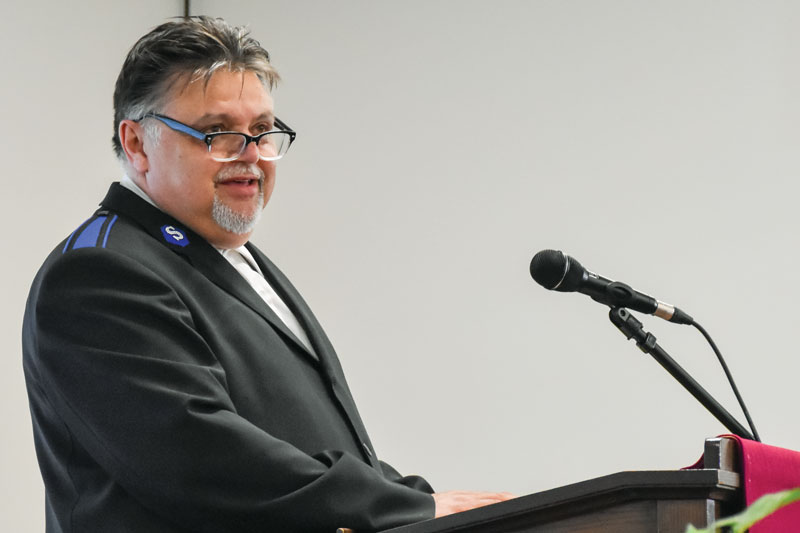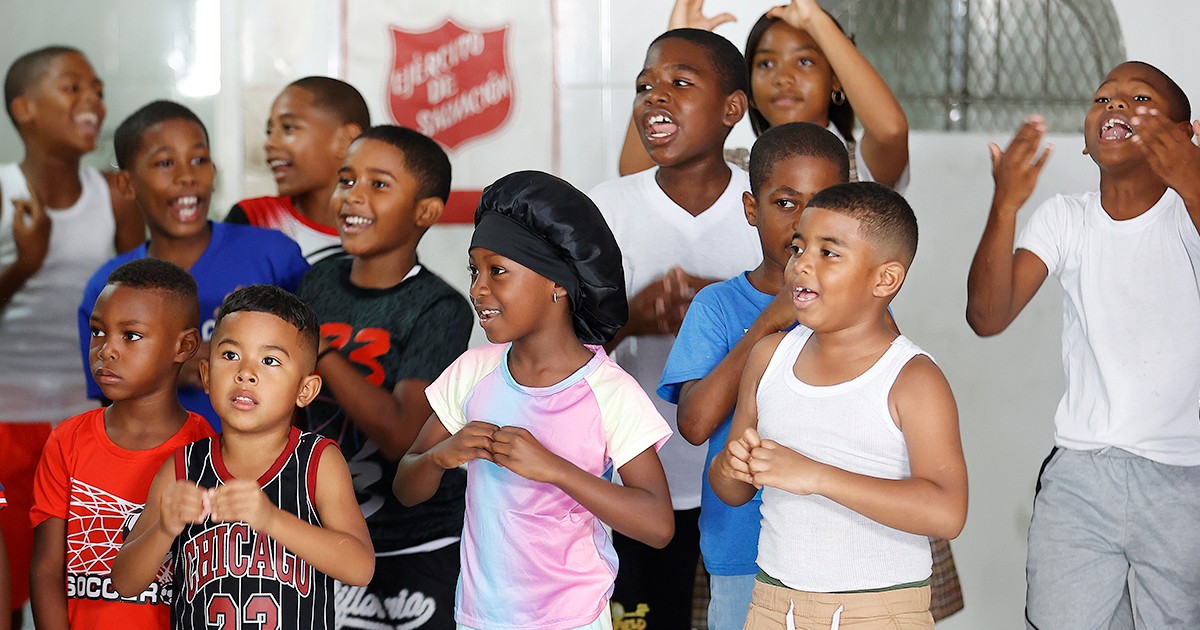I grew up in an Acadian community in New Brunswick, the youngest of eight children in a French Roman Catholic family. My father worked at the paper mill and my mother was a dressmaker. She often made clothes for the poorest families in our neighbourhood—in the winter, it was mittens—and asked me to deliver them.
“Danny, qu’est-ce que t’as fait avec tes bottes? What have you done with your boots?” she exclaimed when I came home from school one day. “There was a poor boy who looked cold, so I gave them to him,” I answered. I was brought up to believe in God, attend church and have compassion.
But as I got older, I fell into the trap of drug addiction. By the time I was 15, I was drinking and doing drugs on a daily basis. What started out as a quest for fun almost destroyed me. I became severely depressed, believing suicide was my only way out. I often walked along the railway tracks at night so no one could see me crying in despair. It was there that I began reciting the prayers my mother had taught me.
Then one day I heard that my sister had become a born-again Christian. She was involved with drugs and criminal activity, so I was curious to see what this religious experience was all about when she came home for Christmas. It didn’t take long before she started talking about Jesus. There was no more talk of drugs or settling accounts. Her new passion for life was palpable.
After a few nights of this, I asked, “What do I have to do to go to heaven?” She said to ask Jesus to forgive my sins and come into my life. In the wee hours of a December morning in 1977, I threw myself on my knees and cried out to God. The atmosphere around me felt thick. I could feel God take me by the hand. He saved me, called me and set me free.
I went on to graduate from Bible college, got married and started a family. For the next 30 years, I served as a pastor, church planter and evangelist. In the francophone community, it’s challenging work. During the Quiet Revolution in Quebec, a period of intense social change in the 1960s, people left the church en masse. Since then, many have considered this province an unreached people group. Québécois are skeptical of religion. Traditional evangelism doesn’t have much impact here; you need to build relationships.
About 10 years ago, I became very sick. A viral infection damaged my heart and it began to fail. I was dying. After a long battle with the illness, I made a full recovery. My cardiologist was speechless.
During my convalescence, I didn’t attend church or even read the Bible. Although I never stopped believing in God, I was fed up with church politics and immature believers. But I started to see things from a whole new perspective. What I thought was a new lease on life was actually God taking me in a new direction, to do what I was created for.
One Sunday night I decided to go to The Salvation Army Booth Centre in Montreal, where my daughter worked. I didn’t know much about The Salvation Army, but I was struck by all the programs they offered. I heard testimonies from men struggling with addiction and proclaiming how God was so present in their lives, regardless of their failings. And I was touched by the officers, who demonstrated such love and compassion. They treated everyone with dignity and respect.
A thought hit me like a bolt from heaven: “This is where I belong—with those who, in weakness, confess their need of God, without pretention.”
The pieces started to come together. I became a soldier and started working at the Booth Centre in customer service. The Army enabled me to further my education, and I obtained a certificate in pastoral and spiritual care from Booth University College in Winnipeg.
Today, I serve as a chaplain at the Booth Centre. I am thankful to God for The Salvation Army, who believed in this old and broken man. For too long my eyes were on the sensational and not on the true need—which is to love the unloving, remember the forgotten and see the immense worth that every sinner has in God’s eyes. I have rediscovered my purpose. I have found myself.
“Danny, qu’est-ce que t’as fait avec tes bottes? What have you done with your boots?” she exclaimed when I came home from school one day. “There was a poor boy who looked cold, so I gave them to him,” I answered. I was brought up to believe in God, attend church and have compassion.
But as I got older, I fell into the trap of drug addiction. By the time I was 15, I was drinking and doing drugs on a daily basis. What started out as a quest for fun almost destroyed me. I became severely depressed, believing suicide was my only way out. I often walked along the railway tracks at night so no one could see me crying in despair. It was there that I began reciting the prayers my mother had taught me.
Then one day I heard that my sister had become a born-again Christian. She was involved with drugs and criminal activity, so I was curious to see what this religious experience was all about when she came home for Christmas. It didn’t take long before she started talking about Jesus. There was no more talk of drugs or settling accounts. Her new passion for life was palpable.
After a few nights of this, I asked, “What do I have to do to go to heaven?” She said to ask Jesus to forgive my sins and come into my life. In the wee hours of a December morning in 1977, I threw myself on my knees and cried out to God. The atmosphere around me felt thick. I could feel God take me by the hand. He saved me, called me and set me free.
I went on to graduate from Bible college, got married and started a family. For the next 30 years, I served as a pastor, church planter and evangelist. In the francophone community, it’s challenging work. During the Quiet Revolution in Quebec, a period of intense social change in the 1960s, people left the church en masse. Since then, many have considered this province an unreached people group. Québécois are skeptical of religion. Traditional evangelism doesn’t have much impact here; you need to build relationships.
About 10 years ago, I became very sick. A viral infection damaged my heart and it began to fail. I was dying. After a long battle with the illness, I made a full recovery. My cardiologist was speechless.
During my convalescence, I didn’t attend church or even read the Bible. Although I never stopped believing in God, I was fed up with church politics and immature believers. But I started to see things from a whole new perspective. What I thought was a new lease on life was actually God taking me in a new direction, to do what I was created for.
One Sunday night I decided to go to The Salvation Army Booth Centre in Montreal, where my daughter worked. I didn’t know much about The Salvation Army, but I was struck by all the programs they offered. I heard testimonies from men struggling with addiction and proclaiming how God was so present in their lives, regardless of their failings. And I was touched by the officers, who demonstrated such love and compassion. They treated everyone with dignity and respect.
A thought hit me like a bolt from heaven: “This is where I belong—with those who, in weakness, confess their need of God, without pretention.”
The pieces started to come together. I became a soldier and started working at the Booth Centre in customer service. The Army enabled me to further my education, and I obtained a certificate in pastoral and spiritual care from Booth University College in Winnipeg.
Today, I serve as a chaplain at the Booth Centre. I am thankful to God for The Salvation Army, who believed in this old and broken man. For too long my eyes were on the sensational and not on the true need—which is to love the unloving, remember the forgotten and see the immense worth that every sinner has in God’s eyes. I have rediscovered my purpose. I have found myself.










Hi Daniel 😊. It's been a long time.tried to reach out to you a few years ago. I hope you are doing well and your family. You helped me out SO MUCH over a few years, I considered you to be a great friend. I still miss talking with you about things... things in general. I just hope that you are doing well. Miss you my friend.